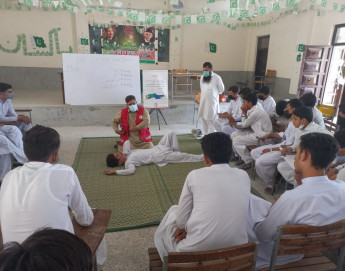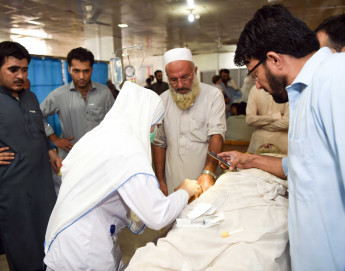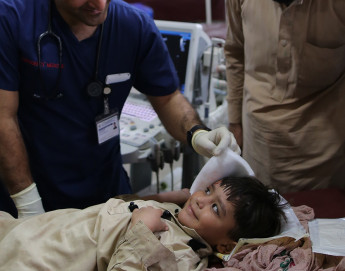
Pakistan: ICRC launches online training to address violence in health-care settings

Health-care workers, now more than ever, have a right to a safe and secure workplace. The COVID-19 pandemic has exacerbated the threat of violence and harassment against health-care workers, causing significant stress on their physical and mental health.
According to a study by the International Committee of the Red Cross (ICRC), an estimated 600 cases of violence against health-care workers, patients and health facilities were recorded in the first six months of the pandemic in Pakistan.
To ensure a safe working environment for health-care workers in Pakistan by training them to de-escalate and manage violence in health facilities, the ICRC launched an online programme on 26 August at an event co-organized with the University of Lahore. Representatives of medical universities and health facilities, and health-care authorities from across the country attended the launch.
Speaking at the ceremony, Dr Salman Shahid, additional secretary of Health Department, Government of Punjab, urged partners from both the private and public sectors to use the programme to train health-care workers. "This training will go a long way as a useful tool that can be utilized by the health sector across Pakistan to ensure that services are provided in the best possible manner," he said.
Developed under the framework of the ICRC's Health Care in Danger (HCiD) initiative, the training programme is based on a 2015-study titled, 'Violence Against Health Care: Results from a Multi-Centre Study in Karachi'.
Carried out by the ICRC in partnership with APPNA Institute of Public Health (Jinnah Sindh Medical University), Jinnah Postgraduate Medical Centre and Indus Hospital, the study highlighted the need to train health-care workers in emergency communication skills to de-escalate violence and also teach them how to break bad news, manage stress and post-traumatic stress disorder, among other things.
Based on the study, numerous training sessions have been conducted since 2017. The new online programme will ensure that this training continues.
"An estimated 600 cases of violence against health-care workers, patients and health facilities were recorded in the first six months of the pandemic in Pakistan."
Talking about the relevance of the online programme, Dr Mirwais, head of the HCiD initiative in Pakistan, said, "We believe this much-needed training will improve the interaction of health-care workers with patients and attendants, empower them to manage aggression and ultimately strengthen the relationship of trust and empathy between patients and health staff."
Professor Lubna Baig, dean of APPNA Institute of Public Health, who helped to develop the programme with the ICRC, said, "Gaining and building the trust of communities with regard to the health-care sector is at the heart of this initiative. That is where the real work starts."
Under the HCiD initiative, the ICRC has been working to promote evidence-based initiatives in collaboration with diverse parties including public health institutions, medical academia, health-care authorities and the Pakistan Red Crescent.
Last year, the committed efforts of the Health Department of Khyber Pakhtunkhwa (KP) and the ICRC led to the passing of the Khyber Pakhtunkhwa Healthcare Service Providers and Facilities (Prevention of Violence and Damage to Property) Act, 2020.
Bharosa Karein, Rasta Dein and Pehlay Zindagi campaigns were also part of the efforts to improve respect for health-care workers and facilities, while also advocating for the right of way for ambulances.




